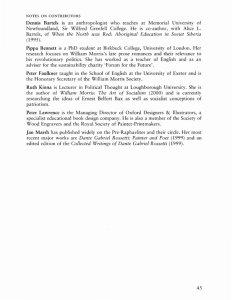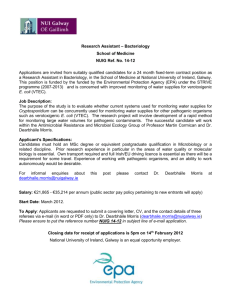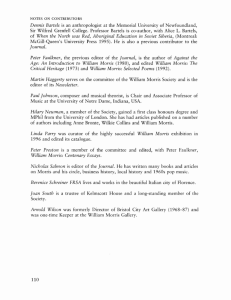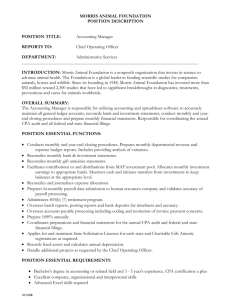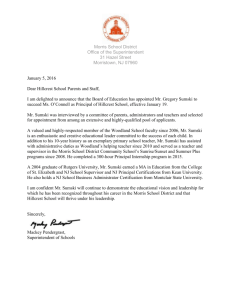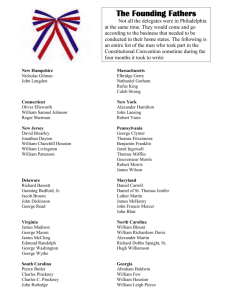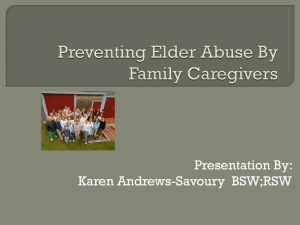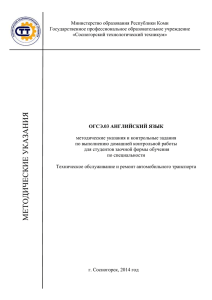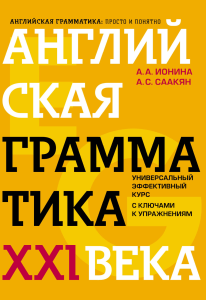Контрольная работа. Задания 1,2
advertisement
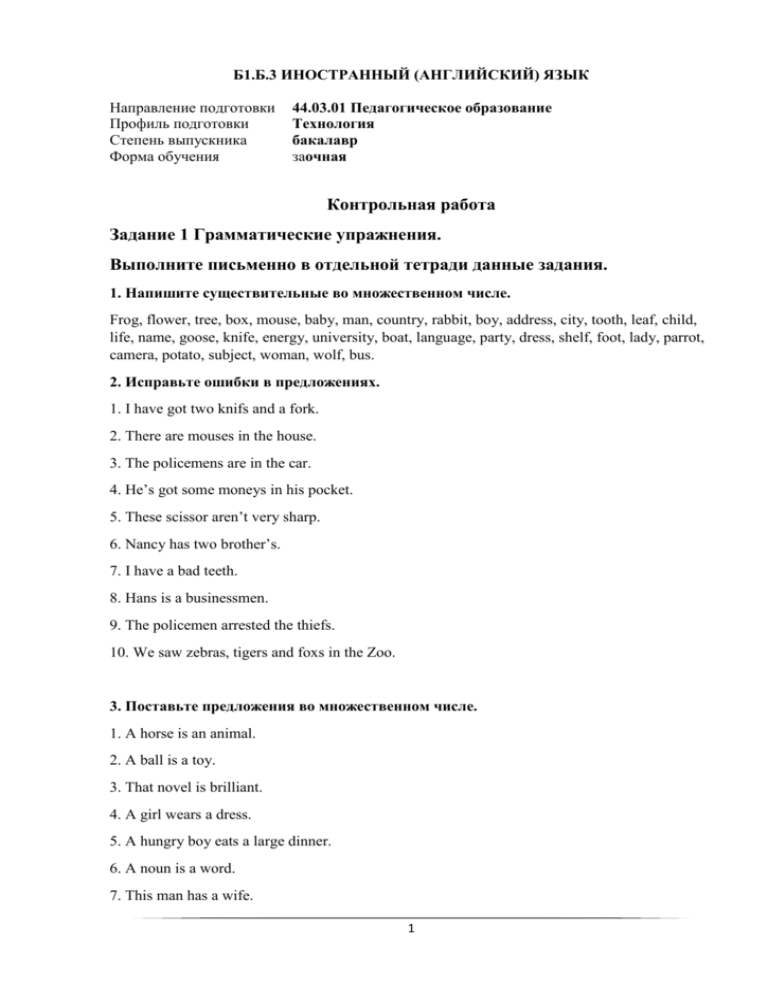
Б1.Б.3 ИНОСТРАННЫЙ (АНГЛИЙСКИЙ) ЯЗЫК Направление подготовки Профиль подготовки Степень выпускника Форма обучения 44.03.01 Педагогическое образование Технология бакалавр заочная Контрольная работа Задание 1 Грамматические упражнения. Выполните письменно в отдельной тетради данные задания. 1. Напишите существительные во множественном числе. Frog, flower, tree, box, mouse, baby, man, country, rabbit, boy, address, city, tooth, leaf, child, life, name, goose, knife, energy, university, boat, language, party, dress, shelf, foot, lady, parrot, camera, potato, subject, woman, wolf, bus. 2. Исправьте ошибки в предложениях. 1. I have got two knifs and a fork. 2. There are mouses in the house. 3. The policemens are in the car. 4. He’s got some moneys in his pocket. 5. These scissor aren’t very sharp. 6. Nancy has two brother’s. 7. I have a bad teeth. 8. Hans is a businessmen. 9. The policemen arrested the thiefs. 10. We saw zebras, tigers and foxs in the Zoo. 3. Поставьте предложения во множественном числе. 1. A horse is an animal. 2. A ball is a toy. 3. That novel is brilliant. 4. A girl wears a dress. 5. A hungry boy eats a large dinner. 6. A noun is a word. 7. This man has a wife. 1 8. A child is a boy or a girl. 9. This classroom has a blackboard. 10. A dentist pulls out a tooth. 4. Переведите предложения с английского языка на русский. 1. I like Ann’s camera. 2. What is the name of this town? 3. When is your sister’s birthday? 4. Do you like the colour of this coat? 5. White your name on the top of the page. 6. What is Jill’s address? 7. What was the cause of the accident? 8. My parents’ house is near the city centre. 9. Maria’s spoken English is very good. 10. For me the morning is the best part of the day. 5. Образуйте притяжательный падеж существительных, используя –‘s, -‘ или предлог of Например: the door / the room – the door of the room the mother / Ann – Ann’s mother 1. the camera / Tom 2. the eyes / the cat 3. the top / the page 4. the daughter / Helen 5. the name / your wife 6. the name / the man I saw you with yesterday 7. the result / the football match 8. the car / Mike’s parents 9. the birthday / my father 10. the garden / our neighbours 11. the children / Don and Mary 12. the husband / the woman talk-ing to Tom 2 13. the house / my aunt and uncle 14. the room / my sisters 15. the house / the Carters 6. Переведите словосочетания на английский язык. Письмо моего друга, адрес Иванова, рассказы этого писателя, биб-лиотека института, карта Европы, сестра жены моего брата, дочь моей младшей сестры, стены этого старого дома, старые стены этого дома, мнение врача. 7. Закончите предложения, используя соответствующие личные или объектные местоимения. Например: I want to see her but she doesn’t want to see me. 1. I want to see him but … doesn’t want to see … 2. They want to see me but … don’t want to see … 3. We want to see them but … don’t want to see … 4. She wants to see him but … doesn’t want to see … 5. They want to see her but … doesn’t want to see … 8. Вставьте соответствующие личные местоимения. 1. I can’t open the door. Can you open … for me, please? 2. These shoes are nice. I shall buy …. 3. I can’t do this job. Can you help …? 4. We are not ready. Give … some more time. 5. She speaks quickly. I can’t understand … 6. Jane is a nice girl. Do you know …. 7. Where’s my book? I can’t find …. 8. My mother writes to me every week, but I don’t write to …. 9. We want to help you. Tell … about your problems. 10. I asked …a question, but you didn’t answer …. 9. Вставьте соответствующие притяжательные местоимения. 1. I like … job. 2. Do you like … job? 3. Does your father like … job? 3 4. Sally is married. … husband works in a bank. 5. I know Mr. Watson but I don’t know … wife. 6. Put on … coat when you go out. It’s very cold. 7. We’re staying at a very nice hotel. … room is very comfortable. 8. Mr. and Mrs. Baker live in London but … son lives in Australia. 9. The company has offices in many places but … head office is in New York. 10. Thank you for … letter. It was good to hear from you again. 10. Заполните пропуски нужными возвратными местоимениями. 1. I cut … with a knife. 2. Be careful! That plate is very hot. Don’t burn …. 3. I’m not angry with you. I’m angry with …. 4. They never think about other people. They only think about …. 5. I got out of the bath and dried … with a towel. 6. When people are alone, they often talk to …. 7. The police say that the woman shot … with a gun. 8. Don’t pay for me. I want to pay for …. 9. He fell off the ladder but he didn’t hurt …. 10. I’d like to know more about you. Tell me about …. 11. Выберите нужное местоимение. 1. Can you speak (some, any) foreign languages? 2. When we were on holiday, we visited (some, any) interesting places. 3. Yesterday evening I went to a restaurant with (some, any) friends of mine. 4. If (some, any) letters arrive for me, can you send them to this address? 5. Don’t buy (some, any) rice. We don’t need (some, any). 6. She said (something, anything) but I didn’t understand it. 7. “What’s wrong?” “There is (something, anything) in my eye.” 8. I’m looking for my keys. Has (somebody, anybody) seen them? 9. There is (somebody, anybody) at the door. Can you go and see who it is? 10. Do you know (some, any) good hotels in London? 4 12. Заполните пропуски местоимениями much, many, little, few. 1. There isn’t … milk in the fridge. 2. Please, be quick! I haven’t got … time. 3. Her English is very good. She makes very … mistakes. 4. He is very lazy. He does … work. 5. “Did you enjoy the party?” “No, not …” 6. How … foreign languages can you speak? 7. There was … food at the party but I didn’t eat … 8. The TV service is not very good. There are … good programmes. 9. … was said but … done. 10. In summer the weather is very dry. There is very … rain. 13. Переведите на английский язык следующие словосочетания. Много тетрадей, много молока, мало воды, много дней, мало газет, немного мела, немного снега, много лет, много картин, много музыки, мало сахара, немного чая, немного лимонов, много мяса, много комнат, мало учителей, мало работы, немного воздуха, немного птиц, много машин. 14. Напишите словами и прочитайте следующие числительные. 3 13 30 4 14 40 5 15 50 8 18 80 5 12 100 226 705 1,000 4,568 6,008 75,137 425,712 1,306,527 2,032,678 67,700,888 15. Переведите на английский язык. 1. Пятьдесят килограммов. 2. Триста автомобилей. 3. Шестьдесят один человек. 4. Тысячи книг. 5. Двести восемьдесят один доллар. 6. Три тысячи шестьсот одиннадцать рублей. 7. Сотни людей. 8. Три сотни домов. 9. Пятьсот грамм. 10. Шестьдесят восемь лет. 16. Напишите по-английски следующие даты и прочитайте их. 1. 12 января 1946 г. 2. 31 марта 1950 г. 3. 22 сентября 1999 г. 4. 21 декабря 1900 г. 5. 23 мая 1010 г. 6 6. 11 октября 2008 г. 7. 1 сентября 1769 г. 8. 15 ноября 2000 г. 9. 6 июля 1570 г. 10. 3 августа 1100 г. 17. Образуйте от следующих прилагательных сравнительную и пре-восходную степень сравнения. Big, heavy, short, dirty, clean, near, bad, famous, little, much, clever, good, expensive, cheap, important, pale, hot, beautiful, large, practical, fat, ear-ly, pretty, happy, bright, dark, dry, flat, fresh, full, quick, late, nice, rich, sad, thin, thick, wet, weak, funny, easy, lazy, ugly, comfortable, quiet, far. 18. Поставьте прилагательные в скобках в нужной степени сравнения. A. There are many … (big) cities in the world. One of … (large) cities in the world is Cairo in Egypt. However, Shanghai and Tokyo are … (large). But Mexico City is … (populated) city in the world. Old cities and towns are … (interesting) places to visit than modern ones. But most modern cities are … (comfortable) to live in; though they are usually … (dirty) than small towns and villages. But still my home city is … (good) place for me. B. 1. Elephant is … (big) land animal. 2. Greyhound is … (fast) dog. 3. Giraffe is … (tall) animal. 4. One of the … (big) and … (powerful) birds is eagle. 5. Hippopotamus is one of … (heavy) animals. 6. Ostrich is one of … (big) but … (bad) at flying birds. 7. Mosquito is one of … (dangerous) insects. 8. Whale is … (big) creature of all. 9. Parrots are … (talkative) birds, they are … (talkative) than people. 10. Tortoise is one of … (slow) animals. 19. Найдите и исправьте грамматические ошибки в предложениях. 1. Mary is pleasanter than Jane. 2. Jannet is more politer than Chris. 7 3. My sister is carefuller than my brother. 4. I am more clever than my brother. 5. My friend Mike is as lazier as me. 6. Jane is taller then me. 7. It is not so cold than yesterday. 8. Spain is dryer than Britain. 9. Your work is best! 10. June is the wetest month of the year. 20. Поставьте в предложениях глагол to be в форме настоящего времени. 1. The book … on the table. 2. My dog … in the bedroom. 3. I … a pupil. 4. Jack and Jill … my friends. 5. … a policeman in the car? 6. We … old friends. 7. … the mice in the cage? 8. Three sheep … in the field. 9. Today …my day off. 10. Scissors …very sharp. Don’t take them. 11. Children … on the playground. 21. Напишите утвердительные или отрицательные предложения, ис-пользуя формы am/am not, is/isn’t, are/aren’t. Например: Paris / the capital of France. – Paris is the capital of France. I / interested in football. – I’m not interested in football. 1. I / hungry. 2. It / warm today. 3. Rome / in Spain. 4. I / afraid of dogs. 5. My hands / cold. 8 6. Canada / a very big country. 7. The Amazon / in Africa. 8. Diamonds / cheap. 9. Motor-racing / a dangerous sport. 10. Cats / big animals. 22. Заполните пропуски, используя правильную форму данных ниже глаголов в Present Simple. Boil be smoke work have teach get love say cost meet Например: She is very clever. She speaks four languages. 1. Steve … ten cigarettes a day. 2. The Bible … love of money is the root of all evil. 3. We usually … dinner at 7 o’clock. 4. She never … up very early. 5. Water … at 100 degrees Centigrade. 6. Food is expensive. It … a lot of money. 7. Your job is very interesting. You … a lot of people. 8. My dad … in Saudi Arabia. 9. Tina is a teacher. She … mathematics to young children. 10. She … a very good sister. We … her. 23. Прочитайте и переведите предложения, исправьте неверную информацию. Например: Mice catch cats. Mice don’t catch cats. Cats catch mice. 1. The Sun rises in the West. 2. The Earth goes round the Moon. 3. The river Volga flows into the Black Sea. 4. Water boils at 50 degrees Centigrade. 9 5. Indians live in Scotland. 6. Our city stands on the river Thames. 7. It often rains in Africa. 8. Tigers eat grass. 9. Elephants kill poachers. 10. The river Amazon flows into the Pacific Ocean. 24. Поставьте вопросы к предложениям, начиная с данных вопросительных слов. 1. Michael works on a farm. Where …? 2. Kevin goes out with his friends in the evening. Where …? 3. You have five lessons on Monday. How many …? 4. It takes me ten minutes to get to school. How long …? 5. My sister plays tennis quite well. How well …? 6. Mr. Johnson lives in London. Where …? 7. We visit our grandparents every summer. When …? 8. Mother goes shopping on Saturdays. When …? 9. They go to school every day. How often …? 10. Nina teaches children at school. Whom …? 25. Напишите следующие глаголы в форме Past Simple, переведите их и выучите формы неправильных глаголов. Take, see, walk, sleep, give, open, lift, bring, finish, say, speak, tell, go, start, play, watch, write, come, like, put, kiss, hate, swim, understand, build, prom-ise, stand, work, jump, teach, study, find, sell, buy, do, wash, want, have, be, explain, sing, know, meet, help, look, sit, make, leave. 26. Переведите текст на русский язык, выпишите все глаголы в про-шедшем времени, найдите их начальные формы. Kate was a shy girl. She studied very well at school. She got only good marks. However, life wasn’t easy for her because it took her a lot of time to prepare for the lessons. Most of her classmates often laughed at her. She didn’t notice that. Kate was strong enough to continue studying as hard as she could. After school she got into a very good university. She became very knowledgeable. Lack of ex-perience was the only problem. While studying she started working for KPMG. She moved up the career ladder very fast. Her salary also increased. 10 At the age of 25 she set up her own consulting agency. She is a very successful business-woman now. 27. Переведите предложения на английский язык. 1. Они купили новый дом в прошлом году. 2. Когда он сказал вам об этом? 3. Он начал писать стихи, когда ему было 14 лет. 4. Мы решили послать эту телеграмму вчера. 5. Кто встречал вас на вокзале? 28. Поставьте глагол в скобках в форме Future Simple и переведите на русский. 1. They (come) in a few days. 2. Helen (find) the book which you need tomorrow. 3. I (give) you a call in the evening. 4. We (stay) at our friends’. 5. The shops (close) at noon today. 6. The plant (die) because of lack of sunshine. 7. The meeting (begin) at eight o’clock. 8. He (graduate) from the University next year. 9. It (get) dark in an hour. 10. We (dine) out tonight. 29. Образуйте отрицательные и вопросительные предложения. А. 1. I go to work by bus. 2. I meet her on Tuesdays. 3. He always wears black. 4. I make cakes every week. 5. She gets up at 6.30. 6. He understands me. 7. He shuts the shop at 6.00. 11 8. She speaks slowly. 9. He leaves the house at 9.00. 10. I read a chapter every night. 11. You eat too much. 12. I see him every day. 13. Tom sings in the choir. 14. He takes the dog out twice a day. 15. We buy them here. B. 1. She saw your brother. 2. We heard a terrible noise. 3. He slept till 10.00. 4. He looked at the picture. 5. They drank all the wine. 6. She thought about it. 7. The police caught the thief. 8. She found her watch. 9. My mother chose this hotel. 10. Keiko taught Japanese. 11. He broke his arm. 12. His wife came at 8.00. 13. His son wrote a novel. 14. They flew to New York. 15. Tom laid the table. C. 1. I shall know the result in a week. 2. You will be in Rome tonight. 3. You will have time to help me tomorrow. 4. You will be able to drive after another five lessons. 5. He will believe whatever you tell him. 6. I will remember this day all my life. 12 7. Perhaps he will arrive in time for lunch. 8. I shall pay him $10. 9. You will need a visa if you are going to Spain. 10. If you learn another language you will get a better job. 11. I will go to the factory every day. 12. I will read newspapers every morning. 13. My sisters will give me books to read. 14. They will go there on Monday. 15. They will often come here if you invite them. Задание 2. Работа с текстами TEXT 1. Прочитайте текст и выполните следующие задания письменно: - подготовьте устно хорошее чтение 1,2 абзацев; - составьте словарик к тексту, выписав с переводом наиболее употребительные слова и словосочетания. - выполните перевод 3,4,5,6,9 абзацев; - сделайте сообщение на русском языке об истории возникновения одежды. The Early Development of Clothes 1. Since the first people put on the first pieces of clothing, what people wear has been in a constant change. Today, changes in clothes are mostly related to style of fashion. 2. For thousands of years in the past, however, changes in clothes were made out of necessity. People were discovering how to make clothes and what kind of clothes to wear. Social scientists believe that people began to wear clothes when they lived in “hunting” and “gathering” societies. People lived in groups because this made the task of getting food easier. In groups such as these, the first clothes developed. They were probably made from animal skins. 3. Many years ago, ice age spread extremely cold weather over large parts of Europe. Some people died from cold some moved to warmer areas, and some tried to adapt. Historians think those were the people who started wearing fur clothes. They discovered that the bear meat could provide food. However, most important, though, they discovered that the bearskin could be made in-to clothes. The people needed something to use to tie on the bearskin. They may have tried a vine at first. Finally, they used sinew, a tough, string like tendon from the leg of an animal. 4. Sometimes, they accidentally pushed holes into the skin when they were preparing it. This led to the idea of deliberately punching holes into it to string sinew through the holes. Lacing skills got better and better. The awl was the tool used to punch holes in skins. Because it was used so much, people gradually changed the 13 awl to make it even more useful. Gradually, a notch was carved in the blunt end of the awl to hold the sinew in place. The other end had been already sharpened to make punching holes easier. Now the sinew could be threaded through the hole. After many years, the eyed needle had been invented. The invention of the eyed needle led to the development of sewing. 5. A second important sewing tool the sewing plate appeared about this time. Made of bone, it was used to push the needle through the hide. This sewing plate was probably, used much as a thimble is used today. Eventually, people began to settle down and live in one place. Living in one place made the next developments in clothes easier. 6. The next development was yarn, a continuous strand, or string of fibers. It is made by twisting and tightening the fibers. The process of making yarn is called spinning. People began to use the stems and reeds of plants and some kind of tree bark. They found that horse hair worked. Perhaps people even got idea of spinning by observing how matted animal hair twisted into strong, ropelike strings. Gradually, they made the tools to spin fibers. 7. After people learned to spin, they mastered the art of weaving. Weaving is a process of interlacing yarns to create cloth of fabric. The first weaving was done by hand. Later, weaving was done on looms. A loom is a frame or machine used to interlace yarn to make cloth. Early looms were small enough to carry around, and hunting and gathering societies undoubtedly used them. However, in agrarian societies, people were settled enough to build large looms in order to weave large pieces of fabric, at this time, advances in fabric making became possible. 8. As people learned more and more about spinning and weaving, they looked around for fibers they could use. A fiber is a slender, elongated strand that can be twisted to form a strong, tight length of yarn. 9. Since the first weaving began, only five natural fibers have been widely used. They are wool, linen, cotton, silk, and ramie. Other fibers, such as alpaca, from lamas, camel’s hair from camels, are sometimes used. For most part, these other fibers are too scarce or too expensive to be used often. 10. All five natural fibers are still used today. Each fiber was developed in a different part of the world and comes from different sources. Every natural fiber can be used to make almost every item of clothing that is worn today. ТEXT 2. Прочитайте текст и разделите его на логические части. Отметьте абзацы в тексте. Переведите текст. Rescue Workers Saved Four People Rescue workers pulled a man, a woman, and two children from this cold, rushing water. The mother and her two daughters got into trouble first. Their car drove off the road into the 14 water. The man, a truck driver, almost died when he tried to save them. The trouble started when Mrs. Leslie Cady lost control of her car on a winding mountain road. The car fell down thirty feet from the road into the water. It rolled over once and landed right side up in the rushing water. All three people were wearing their seatbelts. Nobody was hurt by the fall. However, they couldn't leave the car. The water outside was too cold and too fast for safe swimming. The rescue started almost immediately. Another driver told the police about the trouble. The police called special rescue workers and a truck to pull the car out. The driver of the truck, Paul Ruter, arrived before the other rescue workers. Immediately he took a rope from his truck and he began to walk through the rushing water to the car. Then he got into trouble, too. The water was too fast, the ground was slippery, and he got caught in the ropes. He went under the water by the car. Mrs. Cady saw him and reached for his hand. She pulled as hard as she could and brought him to the car door. Next, the other rescue workers arrived. They put on special suits to stay warm. They brought safety ropes, life jackets, tire tubes, and warm blankets. First, they pulled the people out of the back window onto the top of the car. Then they swam with each person to shore. They saved Mr. Ruter, Mrs. Cady, and the little girls. Finally, all the people went to the hospital. Nobody was hurt badly. The rescue workers said that they all were very lucky to be alive. (Abridged from press) TEXT 3. Выполните задания к тексту: 1. Просмотрите текст и подберите наиболее подходящие заголовки abcd к абзацам текста 1234, соедините линиями: a Different cultures in computer science. 3 в Robert Morris was accused of spreading computer viruses. 1 с Three new bills are being considered at Congress. 2 d Is Morris a hero or criminal? 4 2. Выберите из текста слова и словосочетания, относящиеся к теме «Computer Language». The Computer Hacker Goes On Trial 1. On November 2, 2004 Cornell University graduate student Robert Morris went on trial. He was accused of having caused thousands of computers across the country to stop. They had stopped because he had unleashed a “worm”, a tiny program that copies itself into other programs and diskettes and spreads through computer networks. Otherwise a worm is called a “virus”. While some viruses are mere pranks, others may contain destructive “time bombs”. A time bomb means here a computer program that on a certain date performs a task such as printing a message or more harmfully, destroying data. 15 2. Morris’s trial under a 2004 federal computer-crime law began last week in Siracuse. It appears that Morris’s act has brought out a clash between two very different cultures in computer science. On the one hand, the computing world is dominated by those in business science and national security who find themselves deeply dependent on computers in everything they do. The smooth running of their systems is important to business. On the other hand, there are hackers, criminalminded computer programmers. They hold that the best way to improve a computer system is to toy with it and expose its weak points. 3. The public are sharply divided over whether Morris is a hero or criminal. Morris’s lawyer argued that no great harm was done to the computer. He explains that the young student in computer science was merely running an experiment that spun out of control because of a programming mistake. But the prosecution is potraying Morris as an irresponsible person who has deliberately attacked computers and caused them to shut down. If Morris is found guilty, he faces a 250000 dollar fine and up to five years in prison. 4. Morris is not the first to suffer from the computer-crime laws. More than 200 people have been convicted since 1987. Most of them have been accused of sabotagging or destroying data. All states but one have the same kind of laws. At least three new bills are being considered at Congress. (Time, November 3, 2004) 3. Дайте перевод следующим словосочетаниям: - студент старших курсов Корнельского университета; - быть отданным под суд; - запустить вирус; - шалость; - бомба замедленного действия; - вредоносный, приносящий вред; - стирать информацию с носителей; - тенденции; - выявить конфликт, противоречие; - резко разойтись во мнениях; - проводить, ставить опыт; - выйти из-под контроля; - обвинитель, прокурор; - заниматься вредительством; - законодательный акт. 1. 2. 3. 4. 4. Отметьте (обведите) верные утверждения, согласно тексту: Robert Morris was a junior student of Cornell University. He was accused of having caused thousands of students to catch a virus. A time bomb means here a clock bomb. Morris’s act has brought out a clash between two very different cultures in computer science. 16 5. 6. 7. The public are sure that Morris is a hero. If Morris is found guilty, he faces a valuable fine. Morris can be called the first hacker. 17
